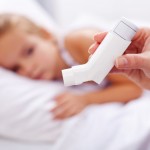Since its theoretical inception, the hygiene hypothesis has become a widely accepted explanation for the swift rise in the number of children with allergic disorders and asthma in the developed world. Even though this notion that the excessive cleanliness displayed in the homes of affluent western societies reduces the microbial (bacteria and other microscopic foreign matter) stimulation needed for children’s immune systems to develop properly is widely accepted, the hygiene hypothesis has yet to be formerly tested or quantified by the scientific method.
That was until recently, when Dr. Erika von Mutius the head of the Asthma and Allergy Department of the Dr. von Hauner Children’s Hospital of the University of Munich, Germany, and her laboratory team undertook the investigation into the possible relationship  between a child’s personal and home cleanliness and their risk of acquiring asthma and/or allergies. The study entitled, “Asthma and the hygiene hypothesis. Does cleanliness matter?,’ was published in the latest edition of the American Journal of Respiratory and Critical Care Medicine.
between a child’s personal and home cleanliness and their risk of acquiring asthma and/or allergies. The study entitled, “Asthma and the hygiene hypothesis. Does cleanliness matter?,’ was published in the latest edition of the American Journal of Respiratory and Critical Care Medicine.
The study utilized the Bavarian PAULA birth cohort, which had been set up to study the impact of both lifestyle and environmental factors on the development of asthma and allergies in close to 600 families recruited in the urban and suburban regions of Munich, Germany between October 1999 and December 2001. The researchers used a telephone and self-administered questionnaire, as well as a dust collection kit to assess the cleaning habits and cleaning frequencies in the homes, the use of detergents, and the personal cleanliness of the study child. Then for each child a skin prick test was administered to detect any dermatologic sensitization that could be attributed to allergies with case definitions as follows:
- Asthma was defined as reported doctor-diagnosed asthma ever, or more than one episode of asthmatic or obstructive bronchitis ever.
- Atopic dermatitis was a reported doctor diagnosis ever.
- Hay fever was considered present if the child was sensitized to any aeroallergen (assessed by skin prick test) and ever had sneezing or a runny, blocked, or itchy nose together with runny or itchy eyes without having a cold after the third birthday.
[adrotate group=”11″]
The main study results showed that there was no significant association between the incidence of asthma, hay fever or atopic eczema and the children’s attitudes to hygiene or the level of cleanliness in their homes. Other important findings included:
- Certain biological measurements were significantly correlated with the habits of hygiene and levels of domestic cleanliness, as well as the amount of household dust.
- There was a correlation between the presence of certain bacterial markers and reduced risk for asthma, hay fever or atopic eczema among the children enrolled in the study.
When discussing these findings, Dr. Markus Ege, a member of Dr. Mutius’s lab team, stated, “Differences in the levels of hygiene have no impact on these bacteria or bacterial components. They are not eliminated by normal cleaning procedures. One cannot turn a household into a cleanroom anyway. Within less than half-an-hour after the floor has been mopped or scrubbed, the bacteria are back.”
Dr. Ege continues, “It is not the amount of dust and grime, but rather its composition that is important, the spectrum of bacterial species to which the children are exposed. It is more a matter of restricted exposure to environmental micro-organisms, which reduces the range of bacterial species with which we come into contact.”
This study is the first to determine that the rise in the incidence of allergic conditions in affluent Western societies cannot be attributed to greater personal hygiene or household cleanliness. Further confirmatory studies need to be conducted in the future to ensure the accuracy of the findings.

